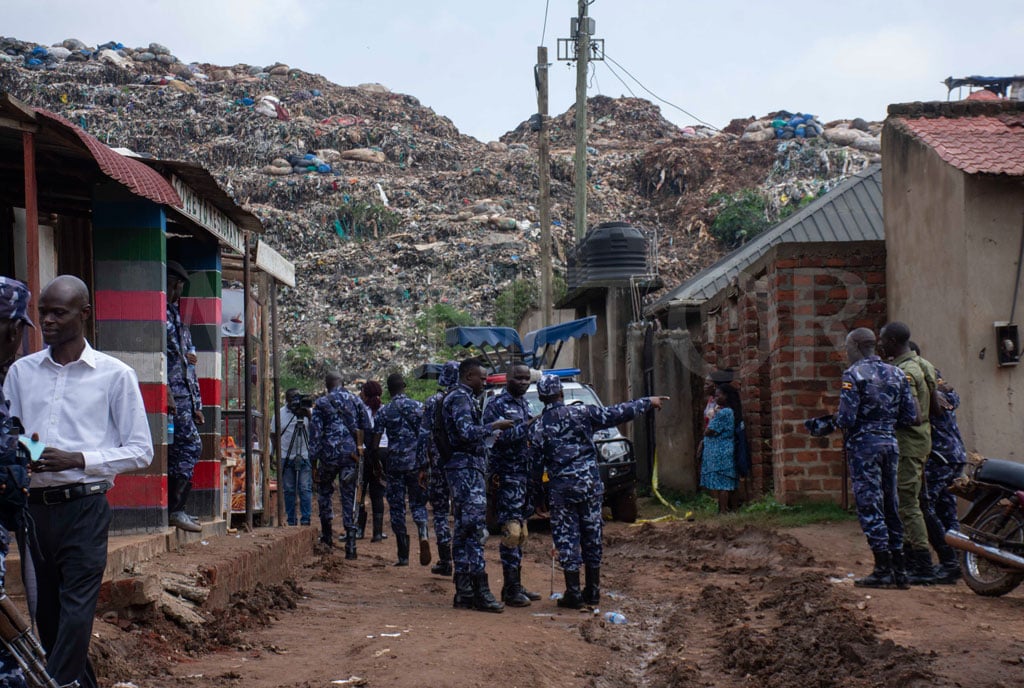
Atiak Sugar Factory where the government is seeking another Shs500b
after sinking Shs481b in the project. PHOTO | FILE
If everything had gone according to plan, by now, Uganda would be an exporter of textile and apparels to all over the world, competing with the likes of Namibia, Lesotho, and Botswana.
On a humid midmorning of December 21, 2002, President Museveni flagged off the Apparels-Tristar Uganda (Ltd), a textile factory, established by Sri Lankan businessman Kumar Dewapura to manufacture garments for export to the United States’ African Growth and Opportunity Act (AGOA). That day, the President even saw off the first shipment of 164,000 pieces of men’s shorts for export to the US.
The factory’s complex in Bugolobi previously housed the Coffee Marketing Board (CMB), the bulwark of Uganda’s coffee industry from the 1960s to 1991 when the process to disband it started.
Officials, including President Museveni, waxed lyrical about the factory as a game changer and creator of employment opportunities for Uganda. The factory was said to employ about 1,000 girls from various corners of the country.
“Let anyone who claims to be speaking about public affairs know that the future belongs to industrialisation, to modernisation. Not to maintain this backward raw material economy which we have been having here,” Mr Museveni told BBC on January 16, 2003.
Twenty one years, the President is still preaching manufacturing, which sector accounts for 15.6 percent to the economy. Uganda was kicked out of AGOA last year in response to the country’s passing of the Anti-Homosexuality Act and all efforts to be readmitted have been met by high walls in Washington DC.
Except, for Apparels-Tristar Uganda Ltd, things started unravelling later in 2003 starting with the protest of the “AGOA girls” over salaries and working conditions. In July 2006, the company closed after a short spell teetering on the edge of financial implosion. This newspaper reported at the time that the government staked more than $11m in the company in form of subsidies, loan guarantees and incentives, which money went up in smoke.
In 2007, Libyan Textile company, Lap Textiles, acquired a 60 percent stake in the ghost project, which had now been taken over by the government. Still, the venture never recovered.
During a parliamentary hearing in subsequent years, Mr Vellupilai Kananathan, who was involved with Apparels-Tristar Uganda (Ltd), told MPs that they only invested “technical expertise” in the venture.
“We didn’t bring in any cash at all,” Mr Kananathan told startled MPs.
The list of such government’s dangerous entanglement with what many have come to believe are dubious investors has since been populated with even shadier examples dressed as research and development (R&D) projects to spur economic development. Some critics have accused the government of “laundering” taxpayers’ money through such ventures.
Strategic investments?
“No, we are not laundering money. These are investment proposals that are strategic in nature and are meant to unlock investment opportunities in certain areas or regions. Like Atiak, it is meant for unlocking investment potential in the sugar industry in northern Uganda,” argued Deputy Secretary to Treasury (DSST) Patrick Ocailap.
He added: “The government sees things in a strategic way; so let us not be obsessed by some of these things, or how much we are putting in the short term.”
After multiple inquiries in the unending investments in Atiak Sugar Factory, ROKO Construction Company and Dei Bio Pharma Limited, where government has sank billions of taxpayers’ money, Parliament last week directed Minister of Finance Matia Kasaija to table a comprehensive accountability and status reports of the ventures
Parliament also directed the ministry to halt all funding for the International Specialised Hospital in Lubowa, on Entebbe Road, citing absence of tangible work and possible over payments.
The calls for accountability followed oversight visits by the Opposition Cabinet to the said entities late last month, and findings of the Parliament’s Accountability Committee that reported the possibility of taxpayers’ money being misused or the projects going up in flames in the long run.
The Leader of the Opposition in Parliament, Mr Joel Ssenyonyi, argued that while investing in private companies to stimulate economic growth, foster innovation, and address strategic national interests is imperative, it should be done judiciously to ensure taxpayers’ money is effectively and rightfully used.
Inversely, government officials, including President Museveni, have strongly rallied behind the interventions through participation of the Uganda Development Corporation (UDC) as well thought-out and strategic to drive economic development, create employment and open up new avenues of resources in these industries.
“If you go to Kalangala islands for a weekend and you pass Bukakata, the ferry services you'll find there are UDC establishments. Because we have almost 50 percent stake. When you reach there and switch on electricity or switch on a tap of water, take a shower, you know we also supply electricity and water on that island,” argued Dr Patrick Birungi, the UDC executive director.
“So, we intervened in that sense in a project or a company called KIS [Kalangala Infrastructure Services]. If you go to the western part of the country from Kyenjojo up to Kisoro, you'll find some tea processing facilities. So, we have co-invested with the private sector in tea in Kyenjojo, in Kabarole District, Kanungu, Kabale and Kisoro districts. There we process tea,” he explained.
He explained that the investments are meant to increase exports and create more jobs.
However, these assurances have largely fallen short, especially considering the mystery that surrounds these transactions. Case in point is the Atiak Sugar Factory where the government is seeking an extra Shs500b, even with no tangible sugar production yet after sinking Shs481b in the project since 2020.
Gobbling billions
If availed, the additional financing will bring the government's total investment into the firm owned by Ms Amina Hersi of Horyal Investment Holding Company to a whooping Shs1 trillion.
Mr Herbert Kafeero, the programmes and communications manager at SEATINI-Uganda, a budget and taxation advocacy NGO, concurred that on paper, the projects look good because they promise quite a lot.
“However, when it comes to implementation that is where the problem is. For example, Lubowa; everyone is concerned about how it has stalled. But even when it has stalled, the government has continued to issue promissory notes up to a tune of $156 million as of February 2024, but there are concerns and we don’t see much going on,” Mr Kafeero said.
He added: “Some of these [projects] have in a way seemingly become money scooping ventures because we are not seeing value for money. We need to put our resources, or enter partnerships that create value. Look at Atiak, when you look at what the project promised, what is on ground leaves a lot to be desired.”
In Dei BioPharma Limited, a drugs and vaccines manufacturing plant owned by businessman Mathias Magoola, the government has so far invested Shs723b since its inception in 2021. The company came to the limelight at the peak of the Covid-19 pandemic with promise of producing vaccines, which never materialised.
Sooner, the company shifted goalposts to production of generic medicine, which the government argued would not only lower the costs of essential medicines, but also open up the pathogen economy. To date, there are no medicines produced.
Yet still, the government’s stake in the company remains a secret. In April, the Minister for Science and Technology, Dr Monica Musenero, said the Attorney General was working out the specifics of ownership.
Dr Birungi said if you are looking at financial returns, they are not there. “Most of the projects are still in that gestation period of growth before breaking even. But if you are looking at economic returns, enormous economic returns exist even today. For example, we are employing more than 3,000 Ugandans in different projects across the country. So, I think that's a big economic return, but there may be no social return,” he said.
Diving in with the head
According to an October PAC report, there was no due diligence undertaken prior to investment in Dei Bio Pharma Ltd. The worth of the company was unknown, there was no MoU spelling out key obligations, and there was no disclosure of beneficial owners.
Similarly, the government has to-date invested Shs266b in ROKO Construction Company Ltd that was facing financial hardships at the time, in exchange for preferential shares (15 percent). The government said the investment would save more than 1,800 jobs, and enable continuation of government projects, including the completion of the stalled Parliament building.
Two common characteristics surround all these projects; secrecy and mystery, and questionable procedures while allocating monies. The Opposition cabinet led by Mr Ssenyonyi was on October 14 denied audience with the ROKO executives and locked out of the premises in Kawempe, where they had gone for an interface to establish how the public funds were utilised. Likewise, the group was denied access to the construction site of the Lubowa International Specialised Hospital where the government has so far spent Shs476b.
Separately, the taxpayer-funded Kira Motors Corporation has also not commenced operations six years after the government okayed its investment. This publication reported earlier that the plant has produced 39 vehicles with an investment of Shs335b. The plant is now seeking Shs524b to break even by 2033.
The DSST, Mr Ocailap, described the projects as key to the government's research and development, which require substantial investments in the short to medium term.
“Kira Motors is researching car manufacturing…yes it's expensive but they’re assembling cars and vehicles are moving. Let’s see what they are doing or can do, then you can condemn them. These are not guesswork. They’re well calculated strategic interventions to try to unlock certain potentials….which will give you massive export earnings,” he noted.
Like multiple actors have chorused, Mr Kafeero raised concern on how the government chooses ventures to partner with.
“There are concerns around the monitoring and oversight. Even citizens don’t know what is happening. Some of these have become white elephants. There is a lot of desire to ensure transparency and accountability because where taxpayers’ money has been directed, we have to follow the money and ask these questions,” he said.
Dr Birungi dismissed claims of interference on where they invest or who they advance credit.
“In choosing which company to work with, UDC considers the need to do a trade balance by import substituting or export promoting, employment creation, we are interested in getting as many young people into decent employment, regional balance, utilisation of local raw materials, and local entrepreneurship development by providing patient capital,” he said.
Other investments of the government include a 50 percent stake in the Speke Resort Convention Centre and 25 percent in Munyonyo Commonwealth Resort. These two investments have also been shrouded in secrecy, and mystery with government earnings, despite heavy investment, unknown. In 2023, it emerged the resort’s books had not been audited for four years. The government co-owns these with Meera Investment Limited owned by businessman Sudhir Ruparelia.
According to the World Bank, cost-benefit analysis entails measuring results, valuing results, and comparing results with costs to provide a comprehensive picture of the net impact of projects and help direct funds to where their development effectiveness is highest.
Amid lingering question marks on transparency and accountability, taxpayers can only wonder if at all there is cost-benefit analysis for the list of projects where the government is throwing their money annually.







